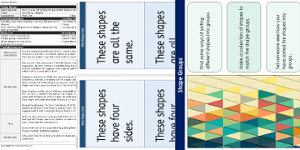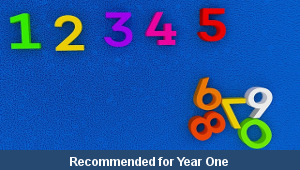Home > Key Stage One > Maths > Year One Planning > Term One
Unit J – 2D Shapes

This maths scheme of work for Key Stage One gets the children to name, describe and compare different 2D shapes by their matching properties by sorting and grouping shapes with the same geometric characteristics. The class can record the sets of shapes that can be seen in different places and used on a range of objects.

Name, describe and compare a range of different 2D shapes by their matching properties by sorting and grouping shapes with the same geometric characteristics

Lesson One : Shape Collections
Identify and record sets of objects that can be seen around the school that match the names and properties of a range of different 2D shapes

Lesson Two : Shape Views
Identify and name the range of 2D geometric shapes that have been used in graphic illustrations to show different parts of a house

Lesson Three : Shape Groups
Select and record different ways of sorting and grouping a range of 2D geometric shapes into groups to match their individual properties

Lesson Four : Shape Labels
Devise and complete labels that can be used to identify and describe shapes sorted into different groups as part of a decorative pattern on a pot

Lesson Five : Clown Shapes
Identify, describe and group a range of different 2D shapes that can be used for some of the features on clown faces by their matching properties
-

Word Matching
Identify, match and record the initial sounds that have been used in a range of cvc words beginning with different letters
-

Family Toys
Investigate and record how a selection of different toys and games that were owned by families have changed and developed over time
-

Subtraction Digits
Model and illustrate how to subtract pairs of single digit numbers within ten using concrete equipment and diagrams to support the subtraction calculations
-

Family Experiences
Practise composing and presenting some example stories with familiar settings to illustrate things that might be experienced by a family
